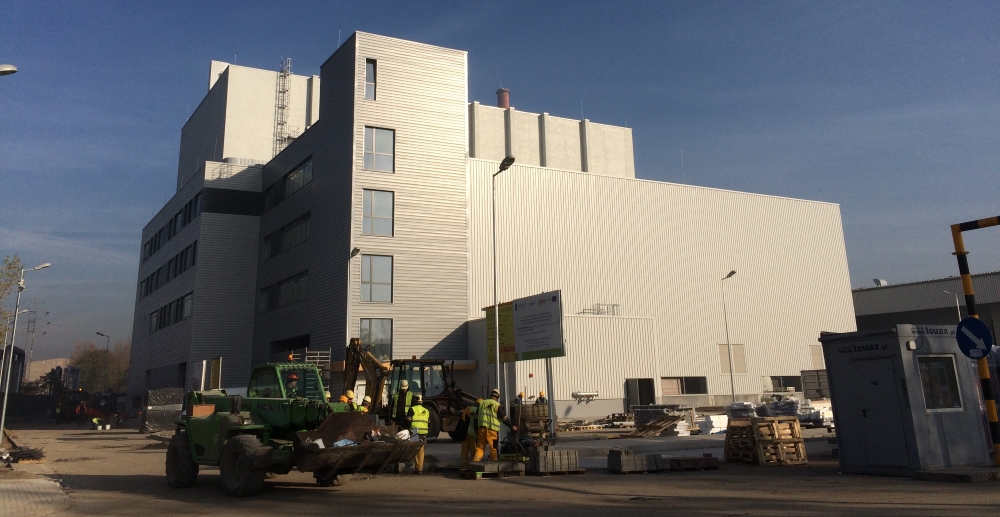
Luxembourg, March 30, 2017 – SUEZ Zielona Energia starts operations of its Energy from Waste plant (EfW plant) for the next 25 years. It is the first example of a Public Private Partnership contract in Poland, completed on time and on budget. With its hybrid financing structure associating private financing to EU funds, it is a pioneer project on the European waste management market.
The investment was completed on time and on budget, i.e. 43 months from the date of signing the PPP contract with the City of Poznań. On 22 December 2016, the project was granted the status of Regional Communal Waste Treatment Installation, meaning that it will receive residual communal waste from Region II, as specified in the Voivodeship Waste Management Plan (including the GOAP association of municipalities and the municipality of Suchy Las). On 29 December 2016, SUEZ Zielona Energia, a 50/50 joint venture between Marguerite Waste Polska and SUEZ Polska, successfully completed the commissioning of the plant by announcing the First Day of Availability after having obtained the integrated permit, the occupancy permit as well as positive clearance from the Voivodeship Environmental Protection Inspector of the Wielkopolskie region.
“We are pleased to commission the plant of Poznań and start operations on time – less than 4 years after the signature of the contract – which demonstrates the capacity of SUEZ to support Polish local governments in developing innovative solutions aiming at saving resources and turning residual waste into renewal energy. We very much look forward to serving efficiently local communities of the region of Poznań for years to come”, declared Stéphane Heddesheimer, CEO of Treatment Solutions for Europe & CIS.
Thanks to this investment, Poznań has joined the group of European cities that effectively take on modern environmental protection challenges.
“We have proved that the interests of both public and private entities can be reconciled for the benefit of the population and the environment. The key factor in the decision to implement the investment through a PPP and to select SUEZ as a partner for this project was its experience in implementing and operating this type of facilities. Thanks to this PPP, we are sure that SUEZ, while building the Poznań Energy from Waste plant, did its best to ensure a high quality of the construction works performed and to make the facility environmentally friendly”, the Mayor of Poznań Jacek Jaśkowiak said.
“The Poznań PPP is a successful example which we hope the other cities in Poland will follow. It illustrates how local governments can work together with private investors to provide a cost-effective solution to an important environmental concern”, added William Pierson, Managing Director of Marguerite.
“The Poznań installation uses grate technology, which thanks to the many years put into its optimisation and improvement ensures high process efficiency while meeting the rigorous environmental standards. Exhaust emission safety is guaranteed by proven purification methods, making EfW plant a safe and non-burdensome neighbour”, said Jean-Michel Kaleta, Member of the Board of the SUEZ Zielona Energia.
The Poznań EfW plant has been developed under a Public Private Partnership, as a result of an agreement made on 8 April 2013 between the City of Poznań and SUEZ Zielona Energia. The total cost of the investment is PLN 832 million (approx. EUR 190 million). The project was financed by private financing associated to EU Cohesion funds. This scheme is a pioneer financing structure (so called hybrid financing). Awards for the innovative financing structure, granted by European institutions, confirm that it was an innovative idea in Poland as well as at European level.
The incineration plant will reduce the amount of landfilled communal waste originating from the capital of Greater Poland and from nearby municipalities, and consequently will serve more than 740 thousand inhabitants. Annually, the EfW plant will generate electricity and heat from about 210 thousand tons of waste. The heat energy generated in the waste incineration process will, through the Karolin cogeneration plant, be provided to the citizens of Poznań. The installation will also supply electricity to the national electric power system. Revenue from selling these two energy types will be transferred to the City budget.
In order to carry out the construction of the EfW plant SUEZ Zielona Energia chose a consortium made of Hitachi Zosen Inova (technology provider) and Hochtief (civil works).

 Back
Back